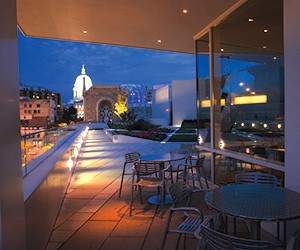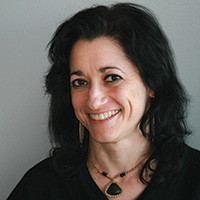The "Mad City" sets its vibrant college town atmosphere against a tranquil backdrop of glacial lakes and forested parks, luring meetings with its balance of progressive lifestyle and natural beauty. And adding fuel to its reputation as a green meeting destination, Madison has more than 6,000 acres of parkland, in addition to cultural pursuits ranging from a center for theater and live music to visual arts.
The State Capitol found itself in the headlines earlier this year, as Madison was host to pro-union protests in the wake of Senate Bill 11, which would limit the collective bargaining rights of some public employee unions. Spirited demonstrations in and around the State Capitol building involved tens of thousands of protestors and stretched on for several weeks on television screens across the nation.
"We certainly have been in the news, reflective of the progressive nature of our city," says Deb Archer, president of the Greater Madison CVB. "The active citizenry is reflective of the population here. We haven't seen any fallout or boycotts or backlash at all as a result of the activity."
Archer attributes the city's emphasis on education and activism as a key to attracting some meetings business, including groups affiliated with the University of Wisconsin-Madison.
"Scholars and researchers from around the world come to Madison to attend the University of Wisconsin-Madison, a globally recognized research institution in a number of fields such as agribusiness, bioscience and high-tech engineering," Archer says.
"The knowledge base here really drives our convention business," she continues. "That follows suit with our progressive, active, intellectual capacity. I think things like environmental policy and research are impacted by politics, and we have strong politics supporting those philosophies and mindsets."
Madison's forward thinking is also reflected in its Midwest hospitality.
"We're all about going beyond as far as an organization, rolling out the red carpet," Archer says. "I always hear that we exceed expectations, going beyond people's imaginations. Madison is not a household name, but people sure remember us when they come here. It's a joy to see people come and become so emotionally attached to this place. It's an inspirational place and people remember it for that reason."
There are many reasons meeting planners choose Madison, including its LEED Silver-certified, Frank Lloyd Wright-designed Monona Terrace Community and Convention Center. The center, also Travel Green Wisconsin-certified, offers a 40,000-square-foot exhibit hall, a 14,000-square-foot ballroom, a 320-seat multimedia lecture hall and 20 additional meeting rooms.
Madison's Alliant Energy Center of Dane County, situated on 164 acres, is another Travel Green Wisconsin-certified facility that is home to a variety of indoor and outdoor spaces, including a 255,000-square-foot exhibition hall, the Veterans Memorial Coliseum and nine agricultural buildings.
The city also is rife with hotel options, including two new hotel projects. Crowne Plaza is slated to open next year near the Alliant Energy Center, with 226 rooms and 14,000 square feet of meeting space.
HotelRED is a boutique hotel set to open this summer with 48 guest rooms. The hotel will be close to the recently opened Union South on the UW-Madison campus, which is home to the 60-room Wisconsin Union Hotel.
"The new Union South on campus was a big undertaking," Archer says. "They tore down the original building and reopened this spectacular building with a theater and many outdoor patios for functions."
Another recent addition to Madison's hotel scene is the Hyatt Place Madison/Downtown, with 151 rooms and 3,330 square feet of meeting space. The hotel is within walking distance from the convention center as well as from Madison's signature State Street, brimming with restaurants.
Other meetings hotels include the Madison Concourse Hotel and Governor's Club in downtown Madison, with 27,000 square feet of meeting space; Best Western Plus Inn on the Park Capitol Square, with more than 20,000 square feet of meeting and event space; the Crowne Plaza Hotel Madison, with over 14,000 square feet of meeting space; Madison Marriott West in Middleton; Hilton Madison Monona Terrace; Doubletree Hotel Madison; Sheraton Madison Hotel; and the Edgewater Hotel, on Lake Mendota.
Off-site options for meetings are varied. Arts buffs can arrange tours or events at a number of popular spots such as the Madison Museum of Contemporary Art, Chazen Museum of Art and the Overture Center for the Arts. Madison is also the home of many independent art studios and galleries and hosts the annual Art Fair on the Square, a juried exhibition, and the complementary Art Fair Off the Square.
Groups can also take advantage of the city's Olbrich Botanical Gardens, Henry Vilas Zoo and Taliesin Preservation and Frank Lloyd Wright Visitor Center, all available as off-site venues.
The Wisconsin Institute of Discovery opened last December on campus in a building that also houses the private Morgridge Institute for Research.
"The entire first floor, called Town Center, is open for meetings," Archer says. "There is a meeting pod in the center—a beautiful space with a Mesozoic Garden inside that can be rented by meetings. It's a great new off-site venue."
The university is also home to science museums, a geology museum and the Babcock Hall Dairy Plant, where the popular Babcock ice cream is made.
Having the university in town helps attract health and environmental meetings, as well as meetings focused on specialized topics such as oceanography and meteorology. There is also a rich Native American history on campus.
The best known and most visible legacies of past native peoples at UW-Madison are the earthen burial mounds that are widely scattered across the campus, with several of the most prominent located in the Lakeshore Nature Preserve. There are four extant mound groups that can be visited, all but one of them located within the boundaries of the preserve.
"We have a strong Native American heritage in this area," Archer says. "We can arrange for Pow Wows for groups."
Outdoor activities are also a meeting attraction, including kayaking, canoeing, paddle boarding or sailing. One outfitter, Betty Lou Cruises, arranges sunset cruises to take in the State Capitol building and skyline from the water. Other options include cross country skiing and ice skating. There are also downhill ski and snowboarding slopes within an hour of the city.
Madison is also implementing a bicycle sharing program, B-Cycle, according to Archer. "Bicycles are a really popular way to see the city. People get pretty excited when they come here and want to spend time outside. It's a very safe and walkable city."




